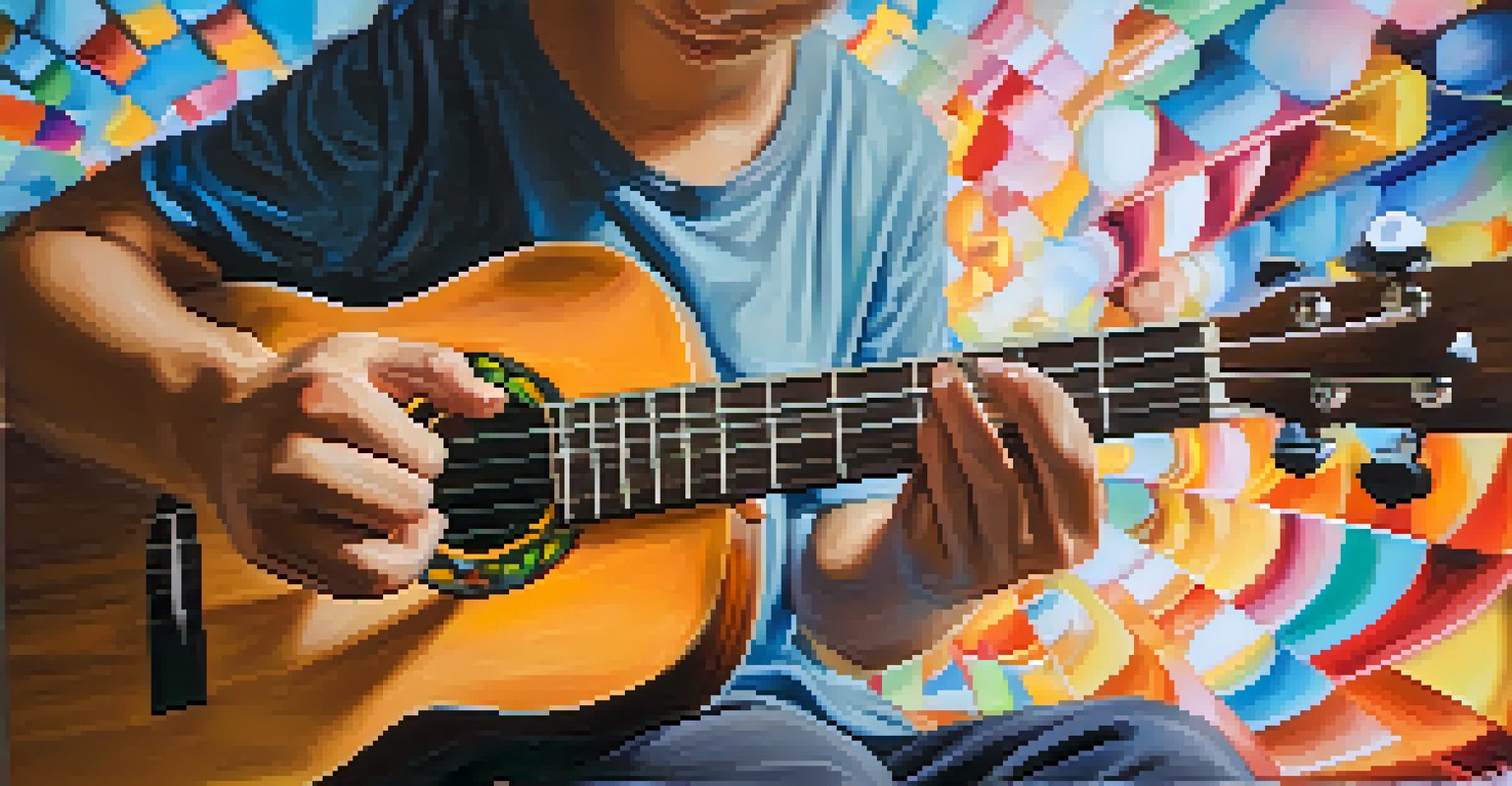How Ukulele Music Facilitates Connection in Therapy Sessions

The Therapeutic Power of Music in Healing
Music has long been recognized as a powerful tool in therapeutic settings. It can evoke emotions, trigger memories, and create a sense of belonging. When clients engage with music, they often find a pathway to express feelings that may be difficult to articulate in words.
Music can change the world because it can change people.
The ukulele, with its gentle and cheerful sound, serves as an excellent medium for this emotional exploration. Its approachable nature makes it less intimidating than larger instruments, encouraging even the most hesitant participants to join in. This sense of accessibility can be pivotal in building rapport during therapy sessions.
Moreover, research has shown that music can lower anxiety and promote relaxation. As clients strum their ukuleles, they often experience a sense of calm that facilitates deeper connection with their therapist and themselves. This connection is crucial for effective healing.
Creating a Safe Space for Expression
A key element of therapy is creating a safe, non-judgmental environment where clients feel comfortable expressing themselves. The ukulele can help establish this atmosphere through its warm, inviting sound. When clients hear the soft strumming, they might feel more at ease, allowing them to open up.

In therapy sessions, playing the ukulele together can foster a sense of community. Clients often find comfort in sharing music, which can lead to discussions about personal experiences and emotions. This shared activity can break down barriers, creating a strong therapeutic alliance.
Music Fosters Emotional Expression
The ukulele provides a safe and inviting way for clients to explore and articulate their emotions during therapy.
Additionally, the simplicity of the ukulele encourages participation from everyone, regardless of musical expertise. This inclusivity helps clients feel valued and understood, reinforcing the therapeutic relationship and enhancing the healing process.
Enhancing Social Skills Through Group Sessions
Group therapy can be a powerful way to help individuals connect with one another. Ukulele music can act as a catalyst for social interaction, allowing participants to collaborate and create together. When clients play music in a group, they learn to listen, share, and communicate more effectively.
Where words fail, music speaks.
Through group ukulele sessions, participants can also practice essential social skills such as turn-taking and non-verbal communication. These interactions help clients build confidence in their abilities to connect with others outside of therapy. The ukulele becomes a bridge, linking individuals through shared musical experiences.
As clients work together to learn songs or create their own music, they often find common ground. This shared experience not only strengthens bonds but also fosters a sense of belonging, which is critical for emotional well-being.
Building Emotional Awareness and Regulation
Playing the ukulele encourages clients to tap into their emotions, promoting greater emotional awareness. As they strum along to different melodies, they can reflect on how various sounds make them feel. This practice can lead to valuable insights about their emotional states.
Furthermore, music can serve as a tool for emotional regulation. Clients can learn to recognize when they are feeling overwhelmed and use the ukulele to channel those feelings into something constructive. By practicing mindfulness through music, they can develop healthier coping mechanisms.
Enhancing Social Skills in Groups
Group ukulele sessions promote collaboration and social interaction, helping clients build essential communication skills.
This process of emotional exploration not only aids in personal growth but also enhances the therapeutic process. As clients become more attuned to their emotions, they can communicate their needs more effectively, enriching their therapy experience.
Fostering Creativity and Improvisation
Creativity is a vital aspect of personal expression, and the ukulele can nurture this side of clients. By encouraging improvisation, therapists can help clients explore their unique musical styles and preferences. This exploration can lead to self-discovery and greater confidence.
Improvisation in music allows clients to step outside their comfort zones and experiment with new ideas. This practice can translate into other areas of their lives, encouraging them to embrace spontaneity and think outside the box. The ukulele becomes a tool for creative exploration and self-expression.
Moreover, fostering creativity through music can help break down mental barriers, allowing clients to approach problems from different angles. This shift in perspective can lead to innovative solutions and a sense of empowerment in their everyday lives.
Strengthening the Therapeutic Relationship
The relationship between a therapist and client is central to effective therapy. Engaging with the ukulele together can enhance this relationship by creating shared experiences that strengthen trust. When clients and therapists collaborate musically, it fosters a sense of partnership.
As they navigate the highs and lows of learning an instrument together, clients may feel more comfortable discussing their challenges and triumphs. This shared vulnerability can deepen the therapeutic bond, making clients feel more supported and valued.
Strengthening Therapist Connections
Engaging in music together enhances the therapeutic relationship, fostering trust and partnership between clients and therapists.
Ultimately, the ukulele serves as a tool for connection, bridging the gap between therapist and client. This strengthened relationship can lead to more meaningful conversations and a more profound healing experience.
Conclusion: The Ukulele's Impact on Therapy
In conclusion, the ukulele is more than just a charming instrument; it is a powerful tool for connection in therapy sessions. Its unique sound and approachable nature create an inviting atmosphere that fosters emotional exploration and expression. By incorporating music into therapy, practitioners can enhance the healing process.
Whether through individual or group sessions, the ukulele promotes communication, creativity, and emotional awareness. Clients can build essential social skills while developing a deeper understanding of themselves and their emotions. The shared experience of making music can create lasting bonds between clients and therapists.

As we continue to explore innovative therapeutic techniques, the ukulele stands out as a valuable asset in promoting connection and healing. By embracing the power of music, we can create more enriching and transformative therapeutic experiences.